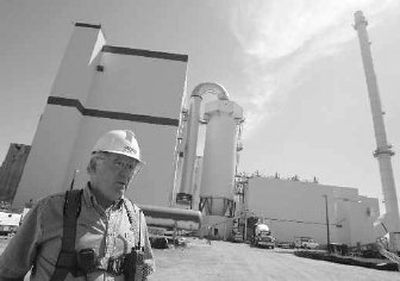Turkey waste-to-energy: Droppings will power first U.S. poultry litter electric plant

BENSON, Minn. — The gray, sandy mix of turkey droppings and other bits and pieces flowing through Greg Langmo’s fingers back onto the floor of his barn isn’t just funky dirt, it’s fuel.
With 16,000 hens gobbling around him, Langmo is standing on a 15-inch layer of turkey litter — some 750 tons of the stuff — that represents a new source of energy.
It will help fuel a $200 million power plant due to begin full-scale production next month. The 55-megawatt Fibrominn LLC plant will be the first poultry litter-fired power plant in the United States, tapping a novel source of renewable energy to produce enough power for 50,000 homes. Its developers are planning similar plants in other major poultry states.
Poultry litter — a combination of droppings, wood chips, seed hulls, shed feathers and spilled feed — has long been spread on fields as a fertilizer. That’s cheap and effective, but it can cause nitrates and phosphates to build up in soil, groundwater and runoff. So poultry producers across the country have been looking for another way to get rid of it.
“We’ve got a long-term, economically and environmentally sustainable alternative to land-spreading — the only advancement in manure management technology since the development of the spreader,” said Langmo, a turkey farmer who’s also fuels manager for Fibrominn.
The poultry industry’s dilemma created an opportunity for Fibrowatt Ltd., which developed three smaller poultry litter power stations in Britain in the 1990s. As it happens, Minnesota is the nation’s largest turkey-producing state.
When the state’s producers learned about Fibrowatt, farmers and local officials began an intensive courtship of the company. At the same time, Minneapolis-based Xcel Energy Inc. was looking for new sources of renewable energy to comply with a mandate imposed by the Minnesota Legislature that requires it to get 110 megawatts of power from biomass annually.
Poultry litter works as a fuel because it’s relatively dry, so it’s easy to burn compared with cow and hog manure, which are too wet and smell far worse. Three tons of poultry litter have about as much energy as a ton of coal. The ash can be sold as a phosphate-rich fertilizer.
And because it’s biomass, it doesn’t contribute to climate change like fossil fuels do. While both release carbon dioxide when they’re burned, the biomass originated in plant material that absorbed carbon dioxide as it grew. Burning fossil fuels, like oil and coal, release carbon dioxide that had long been trapped in the earth.
Fibrominn, a subsidiary of Fibrowatt, has a 21-year contract to sell its power to Xcel Energy, which is already meeting the other half of its biomass obligation with plants that burn wood waste.
“This is a small step but a very important step toward doing something to counterbalance the effects of greenhouse gases,” said Steve Wilson, a purchased power analyst for Xcel Energy. “I think it’s really good for the environment.”
Joseph Romm, a former top Energy Department official under Clinton and author of the global warming book “Hell and High Water,” agreed, saying the plant would be considered greenhouse-gas neutral.
“Obviously there aren’t enough turkeys to generate enough poop to power a nation,” Romm said. “On the scale of things, it’s not a game-changer. … It’s certainly more good than bad.”
Langmo said the plant will consume about 40 percent of the turkey litter Minnesota produces, turning about 500,000 tons of it per year into electricity. Around 20 percent to 25 percent of the plant’s fuel mix will be other biomass such as corn stover, native prairie grasses and wood chips, he said.
Fibrowatt Ltd. was founded by British businessman Simon Fraser and his family, who sold their three British litter-fueled plants in 2005 so they could concentrate on their U.S. business. Fibrowatt LLC, based in the Philadelphia suburb of Newtown, Pa., is now led by Fraser’s son, Rupert Fraser.
Fibrowatt LLC is planning projects in several other major poultry states. Rupert Fraser said they will likely include three plants in North Carolina, one or two in Arkansas, and one each in Maryland and Mississippi.